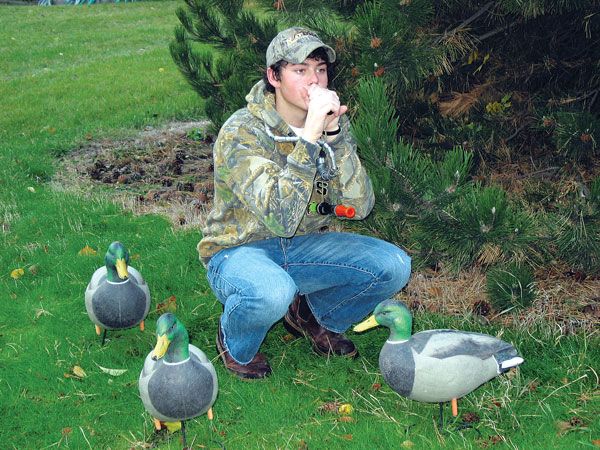Calling all ducks
Published 1:39 pm Friday, November 16, 2012

- A junior at La Grande High School, Mitch Workinger uses his calling skills to win competitive events against other callers and to draw in waterfowl while hunting. DICK MASON - The Observer
Local caller practices an hour a day for five years to prepare for world championships
La Grande High School junior Mitch Workinger will be in world class company late next week.
Workinger will travel to Stuttgart, Ark., to compete in the annual World Duck Calling Championships, which are scheduled for Nov. 23, the day after Thanksgiving. Workinger, one of the top youth duck callers in the Northwest the past several years, is entered in the 14-16 age division.
“I hope to make the top five,” Workinger said.
Workinger has a realistic chance to achieve his goal considering that he is ranked fifth in the international Kruger Farms Point Race for duck callers in the age 16 and younger division.
Workinger qualified for the World Championships by winning the Oregon duck calling title earlier this year.
Bill Saunders, the owner of Bill Saunders Calls and Gear of Kennewick, Wash., a company which sponsors Workinger, said the 16-year-old has a good chance to do well. The LHS junior has a lot going for him, Saunders said, including “good power for his age” and excellent recall.
“He has a very good memory. A duck call routine is a song and he knows the words,” Saunders said.
Workinger also has an outstanding work ethic. He has been practicing at least an hour a day for more than five years. Practice is everything in duck calling, Saunders said.
To make this point, Saunders noted that most top duck callers are 25 and younger. The reason is not that young people have a physical edge but they more often have the time needed to practice extensively.
Workinger, the son of Brad and Lisa Workinger of La Grande, is a member of the pro staff of Bill Saunders Calls and Gear. Pro staff members represent the company at competitive events.
At the world championships, Workinger will be using the same calls that have catapulted him to the world stage. His repertoire includes a hail call, which catches the attention of ducks and geese from 200 to 300 yards; a feeding call, which imitates the sounds waterfowl make while eating; and a comeback call. The comeback call draws ducks when they decide to leave without landing.
The calls are meant to make it easy for evaluators to visualize what the ducks he is imitating are doing.
“You are painting a picture for the judges,” Saunders said.
Callers are evaluated based on power, clarity, flow and realism.
At the world championships in Stuttgart, judges stay behind a blind and never see the callers. They are not given the names of the entrants, further allowing them to focus only on the quality of the calls.
Each caller is evaluated by five judges, none of which can see the others. The high and low scores for each caller are thrown out. This reduces the chance that a score that is exceptionally high or low because the judge may know or recognize the caller, will be counted.
Competitors will call non-stop for 90 seconds once each round. This is a physically draining process, one in which every vein in a caller’s head and neck seems ready to burst for an extended period.
“It is exhausting. You are exhaling as hard as you can for 90 seconds,” Saunders said.
Workinger has been honing his skills since 2006 when he first started calling. He was too young to hunt when he began, but this did not stop him from helping his older brother Taylor and friend Richie Carmichael get waterfowl. Mitch called in ducks and geese for them before he could hunt.
Calling at all competitive events is much different than practicing the art during hunts. In competition, entrants may use the same call for 90 seconds and do it in exaggerated fashion. People who are hunting try to vary their calls and do them more subtly.
Stuttgart has been conducting its championship duck-calling competition annually for 77 years. The event was first a national competition and later became a world championship event. It is put on by the Stuttgart Chamber of Commerce. Stuttgart’s World Duck Calling Championships have been conducted the day after Thanksgiving for many years.
ESPN TV will be taping portions of next week’s competition. Highlights will be shown later.





